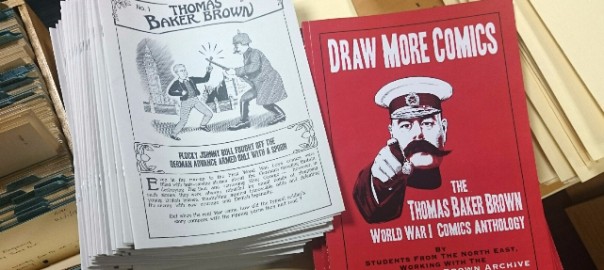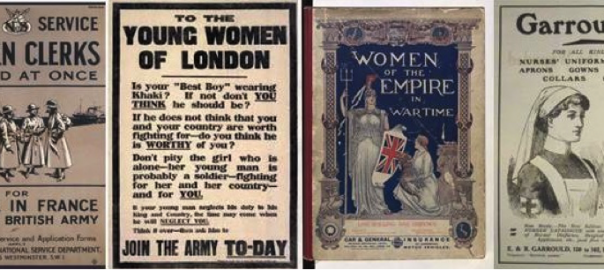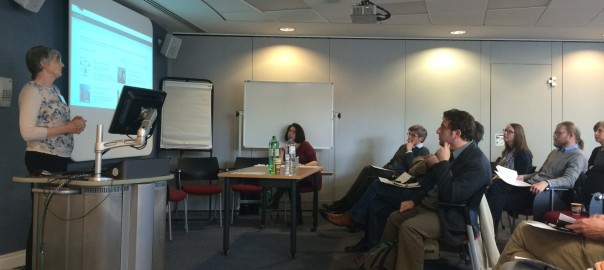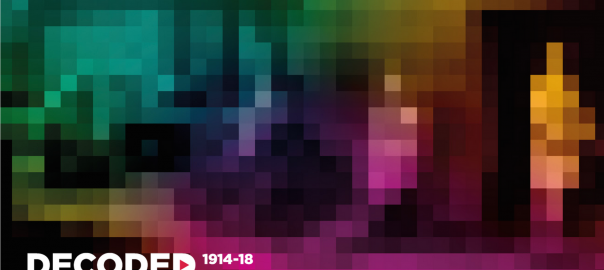Decoded 1914-18 is a two-week programme of AV installations and events across 16-28 February 2015 that explores the First World War and its effect on those living in Tyne & Wear. Seven artists have taken inspiration from Tyne & Wear Archives & Museums collections to create artworks and performances which examine and interpret Tyne and Wear in the First World War in innovative ways. From recreated soundscapes of civic life to a reinvention of communications technologies. The installations and performances explore a range of themes including the role of women in the First World War economy; Wartime communications technologies, particularly radio; the impact of War on folk traditions in the region, and Armed Forces recruitment.
The project is a collaboration between Tyne & Wear Archives & Museums and the Newcastle University Institute for Creative Arts Practice, a contemporary hub for the creative arts at Newcastle University with a remit to explore ideas and challenge perceived boundaries between academic disciplines.
Details of the events (along with opportunities to meet the artists) are as follows:
Sing and Dance for King and Country: An audio-visual installation exploring the experiences of the people of Tyneside during the First World War, through the lens of local folk traditions and practices. It will explore how various folk practices – including rapper dancing, clog dancing, and folksong – can be used to investigate the experiences of war of three groups of people: the rapper dancers of the North East, female munitions workers, and children. Move through the installation in the footsteps of the singers and dancers of 100 years ago, uncovering forgotten and untold stories of how the ordinary people of Tyneside danced and sang their way through the First World War.
The artist, Rachael Hales, is a sound artist, composer and performer, currently studying for a PhD by composition at Newcastle University. Her work investigates ways in which environmental and everyday sounds can interact with musics of place, particularly folk and traditional music, to perform, represent or portray a sense of place.
Venue and date of installation: Discovery Museum – 2nd Floor Balcony: Monday 16 – Saturday 28 February 2015.
Meet the Artist: Wednesday 18 February, 2-4pm and Saturday 21 February, 2-4pm (installation space).
__________________________________________________________________
Shiver the Flowers Like Fear: A sound installation of spoken word, music and sound design framed around the wartime diaries of Gateshead author, playwright and social activist Ruth Dodds. The piece offers insight into Dodds’ experience of the First World War, from working twelve-hour shifts at Armstrong’s munitions factory to finding solace in literature and the Northumbrian countryside. The installation aims to provide a fragmentary portrayal of the everyday struggle to come to terms with senseless, unthinkable circumstance, and the crucial efforts to maintain some semblance of everyday life on Tyneside in such turbulent times.
The artist, Phil Begg, is a musician/composer from Newcastle, who since 2007 has predominantly recorded and performed under the moniker Hapsburg Braganza. He also oversees the genre-defying Tyneside big-band studio project ‘Midnight Doctors’ – with which he has worked with over 30 musicians to date. His music spans and bridges a range of styles including instrumental guitar pieces, electroacoustic composition and improvisation, scored works for instrumentalists, sound collage, ambient music and sound design.
Venue and date of installation: Shipley Art Gallery – Lounge: Wednesday 18 – Saturday 28 February 2015.
Meet the Artist: Thursday 19 February, 2-4pm (installation space).
__________________________________________________________________
Parade Ground: A digital artwork referencing traditional regimental photos on a very large scale. The piece attempts to bring home to the viewer both the terrifying scale of the region’s contribution to the war and the very human and individual nature of this contribution.
The artist, Guy Schofield, is an artist and researcher based at Newcastle University’s Culture Lab working mainly with video, game technology and 3D graphics and animation. He has a BA and MA in Fine Art. His work involves examining the relationship between space and narrative in time-based media: a concern which explored in a number of interactive and video art works, exhibited both in the UK and internationally.
Venue and date of installation: Parade Ground is on display at 3 different venues:
Discovery Museum – When the Lights Went Out Exhibition: Monday 16 – Saturday 28 February 2015.
Gateshead Interchange: Monday 16 – Friday 20 February 2015.
King’s Gate, Newcastle University: Friday 20 – Saturday 28 February 2015.
Meet the Artist: Friday 20 February, 2-4pm (Discovery Museum, When the Lamps Went Out exhibition).
__________________________________________________________________
The Handmaidens of Death: An audiovisual experience which focuses on the role of women in Tyneside’s First World War industrial economy and how these changing roles affected their lives and their perception of themselves. An intimate performance, The Handmaidens of Death uses archival images of female munitions workers on Tyneside from the First World War, archival dramatic and documentary text along with current creative writing to create a looped audio-visual experience that will be projected onto walls and floor to surround the observers.
The artist, Tracy Gillman, is an actor, writer and director currently engaged in doctoral studies in Creative Writing at Newcastle University. Her PhD work-in-progress The Disappearance of Spoons has been given readings, funded by Newcastle University Institute of Creative Arts Practice, at Live Theatre, Culture Lab and Newcastle Centre for Literary Arts. Elements of this work will be used in The Handmaidens of Death.
Venue and date of installation: Tyne & Wear Archives – Education Room: Friday 20 – Monday 23 February 2015.
Meet the Artist: Saturday 21 February 2015, 2-4pm (installation space).
__________________________________________________________________
Tuning In – Listening Back in Time: A reconstruction of time distant voices and personal accounts of events on Tyneside during the First World War. The work will be presented using period audio technology in a science and technology basement store. Listening stations which were based on our North East coast during the First World War were designed to pick up long distant sounds and communications to understand what might happen in the immediate future. These stone and concrete structures may also have recorded powerful memories and events. Tuning In – Listening Back in Time is a reconstruction of those time distant voices and personal accounts of events on Tyneside during that traumatic period. The work will be diffused and realised through the period technology within a Discovery Museum basement tour.
Please note this is a 15 minute tour running on the hour 11am-3pm. Meet at Discovery Museum reception desk. Due to limited places we ask that you arrive early to avoid disappointment.
The artists are Chris Watson and Tim Shaw. Chris Watson is one of the world’s leading recorders of wildlife and natural phenomena. His sound recording career began in 1981 when he joined Tyne Tees Television. Since then he has developed a particular and passionate interest in recording the wildlife sounds of animals, habitats and atmospheres from around the world. As a freelance recordist for film, TV & radio, Chris Watson specialises in natural history and documentary location sound together with track assembly and sound design in post-production. Tim Shaw has worked internationally as a professional composer, performer, sound designer and researcher. His practice incorporates diverse approaches to sound capture and processing, and includes creating immersive and site responsive sonic installations. His compositional methods include field recordings, synthesized sounds and live electronics, providing a wide scope for creative diversity. At the heart of his work lies a concern with the auditory reflection and mirroring of real world environments through sound and technology. He is currently studying a PhD in Digital Media at Culture Lab, Newcastle University, alongside managing record label Triptik.
Venue and date of installation: Discovery Museum – Arcs and Sparks Store (basement): Monday 16 – Sunday 22 February 2015.
__________________________________________________________________
War Workings: Drawing on museum and archive material, Shaw and Bowers will build a sound installation, starting from nothing. The duo invites the public to participate in making, listening to and re-inventing communications technologies from the First World War. Many contemporary technologies have their ancestry in innovations developed to support military activity in the First World War: communications and signalling systems, listening and timekeeping devices. Inspired by artefacts from the Tyne & Wear Archives, Shaw and Bowers will build a sound installation on site over a two-day period. The artists’ process will be publicly open. Starting from nothing, the duo will build, create and install the work inviting the public to join them in making, listening and re-inventing war technology.
The artists are Tim Shaw and John Bowers. Tim Shaw has worked internationally as a professional composer, performer, sound designer and researcher. His practice incorporates diverse approaches to sound capture and processing, and includes creating immersive and site responsive sonic installations. His compositional methods include field recordings, synthesized sounds and live electronics, providing a wide scope for creative diversity. At the heart of his work lies a concern with the auditory reflection and mirroring of real world environments through sound and technology. He is currently studying a PhD in Digital Media at Culture Lab, Newcastle University, alongside managing record label Triptik. John Bowers is an artist-researcher working within Culture Lab with a particular interest in the use of art and design-led methods to explore digital technologies and novel interaction concepts. He also works as a sound artist improvising with electronic, digital, acoustic and electro-mechanical devices and self-made instruments in performance and installation settings, typically accompanied by live digital image.
Venue and date of installation: Discovery Museum – Science Maze: Wednesday 25 – Thursday 26 February 2015.
Meet the Artist: Wednesday 25 and Thursday 26 February, 2-4pm (installation space).
__________________________________________________________________
Sound Mirrors: A durational sound performance which re-imagines the acoustic experience of war and connects, in an act of two-way mirroring, the sonic experience of war with contemporary local soundscapes. Dotted along the east coast of England, large concrete structures were built, sound mirrors, which enabled enemy aircraft and Zeppelin airships to be heard before they were seen, providing early warning of potential attack. Many of these survive and still stand, listening to the contemporary world. Sound Mirrors is a durational sound performance which re-imagines the acoustic experience of war and connects, in an act of two-way mirroring, the sonic experience of war with contemporary local soundscapes.
The artists are Tim Shaw and John Bowers (see details for War Workings above).
Venue and date of installation: Discovery Museum – Great Hall: Friday 27 February, 2-4pm.



